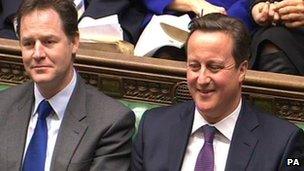Boundaries: a running sore?
- Published

Is the decision to vote different ways all about timings - or feelings?
Back in the early days of coalition in 2010, as the nights were drawing in, a minister got to his feet in the House of Commons and told MPs the following:
"To the people we serve it is patently obvious that individuals' votes should carry the same weight, and if that means reforming the rules for drawing boundaries, that is what we must do....Our priority must be to ensure that a person's vote is of equal worth, wherever they live in the UK. If the current rules distort that, they surely need to change."
A few weeks later, he said:
"It is right that constituencies are more fairly sized, so that the weight of a person's vote does not depend on where they live. It is right that we reverse the unintended trend that has seen this House grow in size and cap its membership at a more reasonable number...There can be no justification for maintaining the current inequality between constituencies and voters across the country."
The first quote came from the second reading of the Parliamentary Voting System and Constituencies Bill on 6 September 2010; the second came from the bill's third reading on 2 November. The bill was designed to cut the number of MPs from 650 to 600 and redraw the constituency boundaries accordingly.
And the minister who delivered these words? As you have probably guessed, it was the deputy Prime Minister, Nick Clegg.
Today Mr Clegg has the unenviable task of eating those words as he leads his MPs into the division lobbies of the House of Commons to delay boundary changes well beyond the next election.
Mr Clegg's defence of this volte face is straight forward. Here he was on The Today programme on 15 January this year:
"You will remember, of course, back in the referendum on the Alternative Vote system the highly regrettable personalised attack by the Conservatives then. You will remember, of course, the House of Lords debate where the Conservative Party decided not to proceed with reform even though it was in their own manifesto and the Coalition Agreement. I have been very open about the fact that a coalition, by definition, is a package deal and when one side of that package, that deal, does not honour their side of the agreement then I think it's perfectly reasonable for the other side (to look at other parts of it). We are not voting them down; what we are saying is there is going to be a delay of five years. We are leaving the boundary changes on the statute book but we are saying that we should miss a beat and do it in the next parliament not this one."
Part of this is not unreasonable. The Lib Dems say they have done their duty as coalition partners and taken a lot of flak for supporting health reforms, welfare cuts and so on. They say at the first sign of trouble the Tories caved in to their backbenchers over Lords reform. The arguments about what exactly was agreed in the coalition talks on constitutional change are somewhat circular and boring. Suffice it to say that the Lib Dems and Conservatives disagree about how much the boundary changes were in any way tied to Lords reform.
The bottom line, though, is that the Lib Dems today are voting to delay something that they in their heart of hearts dearly support, namely the idea of fair votes, the concept that everyone's votes should have an equal weight in electing an MP.
And yet behind the arguments about the quid pro quo of a coalition package lies a modest slither of psephological self-interest. At the next election, the Lib Dems will depend heavily on the personal popularity of their existing MPs to thwart the national tide as they try to hold onto seats across the country. And with constituency boundaries remaining unchanged, the power of that incumbency will be undiminished.
As for the Conservatives, there will be some anger on the backbenches towards the Lib Dems. But the Tories voted against Lords reform in the full knowledge that it could spell the end for boundary changes and the 20-odd seats it could gift the Tories.
And yes, for all the talk of principle, many Tories might just be voting for electoral self-interest rather than an enthusiasm for improving democracy. So some salt will need to be taken with all the huffing and puffing. The question is whether the anger lingers and becomes a running sore in the side of the coalition.
My own guess is that it will not. Not least because many Tory MPs - as individuals - will not grieve too much at the loss of boundary changes. The Tory party's strategy at the boundary review - as a party - was to reduce the number of safe Tory seats so their votes were more evenly spread among more, winnable marginal seats. This was never going to be something that made Tory MPs happy. So with no boundary changes, there will be fewer Tory MPs seeing their majorities reduced.
Where the pain will linger is within Downing Street. Some Tory strategists are quite open in saying that the party is unlikely to win the next election without the 20-boundary change seats.
So the Tories might lose the vote today but I doubt that they will give up the battle. Between now and the election, Number 10 will be looking for something that the Lib Dems want more than anything else in the world and see if they can trade it for boundary change. This ain't over yet.